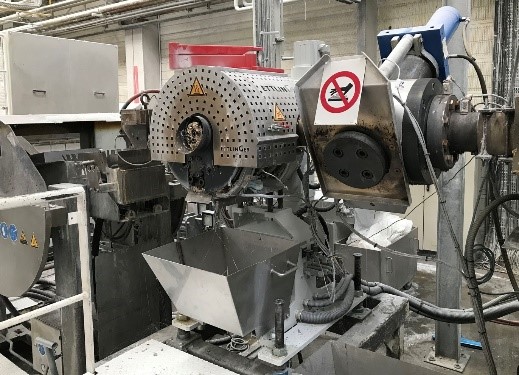High-performance melt filters from ETTLINGER:
60-micron filtration improves performance and cost efficiency in RPET bottle-to-bottle process
Oberglatt, Switzerland, April 7, 2021 – Calculations of the expected ROI and extended production trials at a major packaging manufacturer have impressively confirmed the superior performance of ETTLINGER’s ECO melt filters in PET bottle to bottle recycling processes.
Recyclates based on 100% PET bottle flakes, which during their production pass through a self-cleaning ECO high-performance melt filter from ETTLINGER with a filter fineness of 60 µm, are characterized by particularly low residual contents of contaminants. This makes them suitable for demanding RPET products, as numerous successful practical projects in the fields of sheet and strapping as well as fibers show. One of the world’s largest manufacturers of food and beverage packaging has now put the reliability and economy of the ECO for the RPET bottle-to-bottle process to the test and confirmed both in use. A calculation of the ROI based on a comparison with the backflush screen changer previously used in the company showed a clear decision to use the ECO.
By optimization of the upstream and downstream equipment of the extruder, including the ECO installation, replacing an existing screen changer, the re-pelletizing line is now capable of processing up to 1000 kg/h. This was proven in an acceptance test. A higher cost efficiency also results from the reduced melt loss in the filter from formerly 1,5% down to 0,6%
Pilot test runs confirm decision to switch to ECO technology
According to the customer, very satisfactory experiences in production have confirmed the decision taken on the basis of the predicted ROI. Particularly worthy of mention is the fact that the system has remained stable for more than eight weeks as well as the low level of operator assistance required. Reduced level of operator assistance improves operator health safety and minimizes risks for injuries on hot melt and surfaces, as existing on the former screen changer with much higher operator involvement.
Consistent quality acceptance of the converter, using the final pellets in bottle productions process, confirmed the ECO filtration efficiency. In comparable projects chemical analyses proved only slight degradation of the RPET well below the set limit values, as an advantage of the short residence times in the ECO melt filter.

Rotating, cylindrical steel screen as key element
The key element for the advantageous properties of the ECO melt filters is the rotating cylindrical steel screen with millions of laser drilled conical holes through which the melt is forced from the outside to the inside. This leaves impurities on the surface, from where they are continuously removed by a scraper. Uwe Kellner, Managing Director at ETTLINGER: “In general, the PET world has much higher demands on the efficiency of melt filtration than other areas of plastics recycling. Where conventional screen changers and screens reach their limits, our self-cleaning ECO filter systems offer considerable reserves to meet even the toughest specifications. The breakthrough came with the recent market launch of a micro perforation with a previously unattained filter fineness of 60 µm. This means that we now also meet the particularly high requirements of PET recycling.”
In fact, woven steel screens, that are used as a standard in simple screen changers, are also available with a filter fineness of 60 µm, even lower. The individual wires of a screen mesh are only connected loosely to each other. So the meshes can further expand as the filter cake grows and pressure increases. As a result, impurities such as aluminum or paper as well as the so-called “black specks” contained in the PET bottle flakes regularly find their way into the recycled material, causing expensive scrap. In addition, the build-up of a filter cake causes significant pressure fluctuations which, together with the measures required for cleaning, have a negative effect on the downstream pelletizing process steps. Whereas the consistent differential pressure of the ECO is strongly supporting the resulting consistent pellet quality.
For recyclates with virgin materials’ performance
“Compared to steel mesh screens, the rigid screens of the ECO melt filters with their laser-drilled micro perforation, in combination with permanently cleaning of the surface, enable much better separation performance”, Kellner continues. At 60 µm filter fineness, the remaining impurities, smaller than 60 microns, are almost no longer visible to the human eye or will not be noticed. An important aspect in clear PET bottle production”.
Recycled PET produced in this way and used for fibers or tapes is considerably less prone to breakage due to the significant reduction of black specks and other particles. This ultimately increases the efficiency of the line, which in turn leads to considerable cost and time savings.